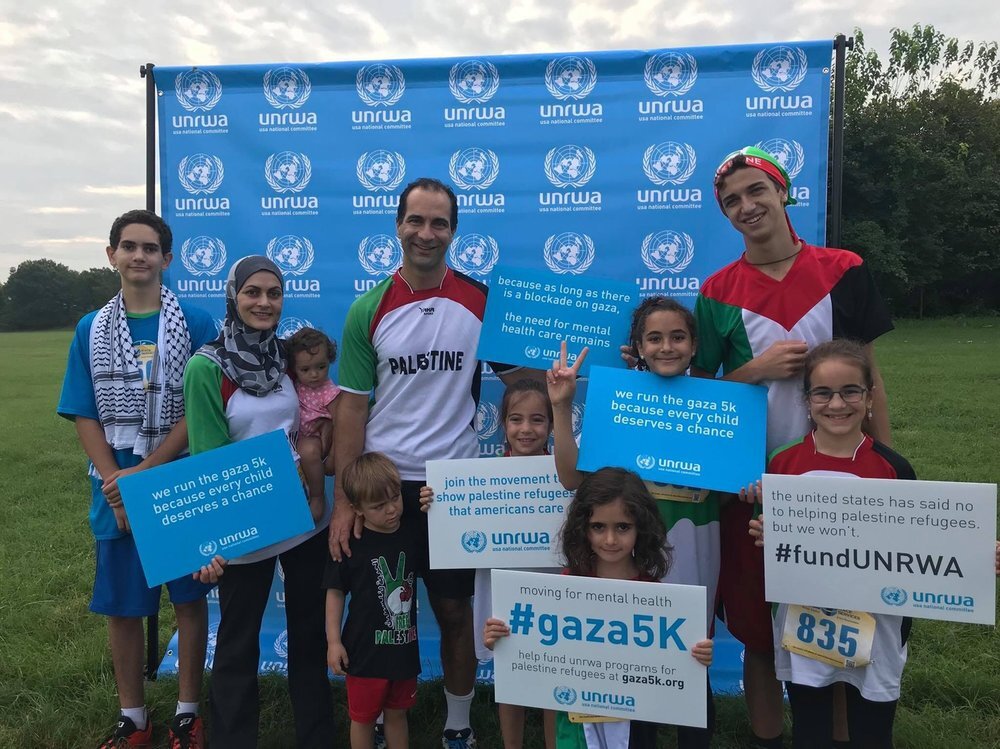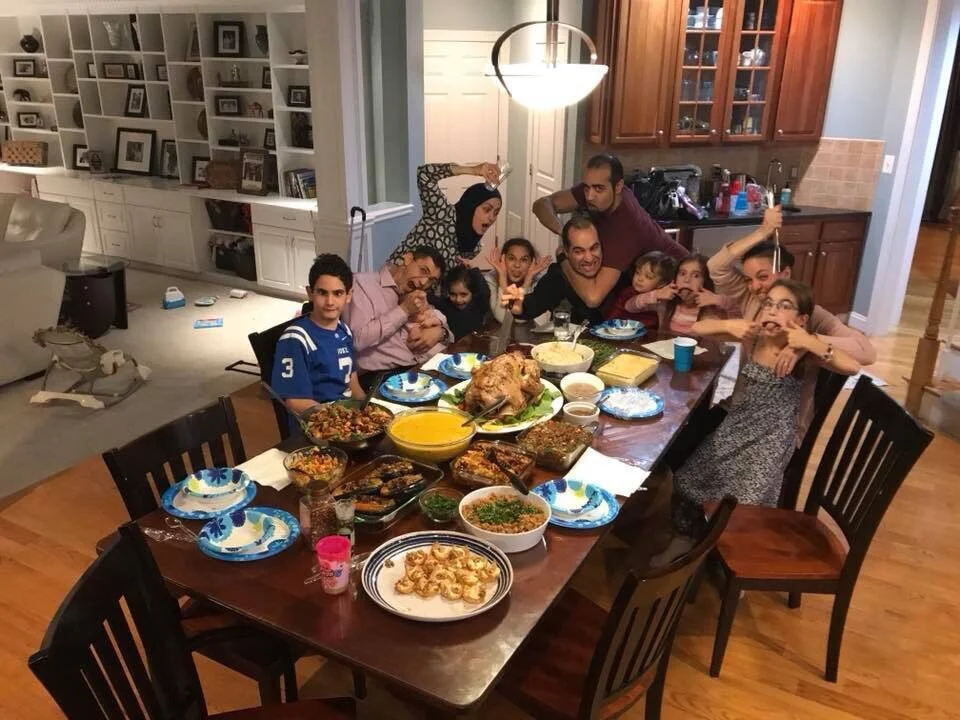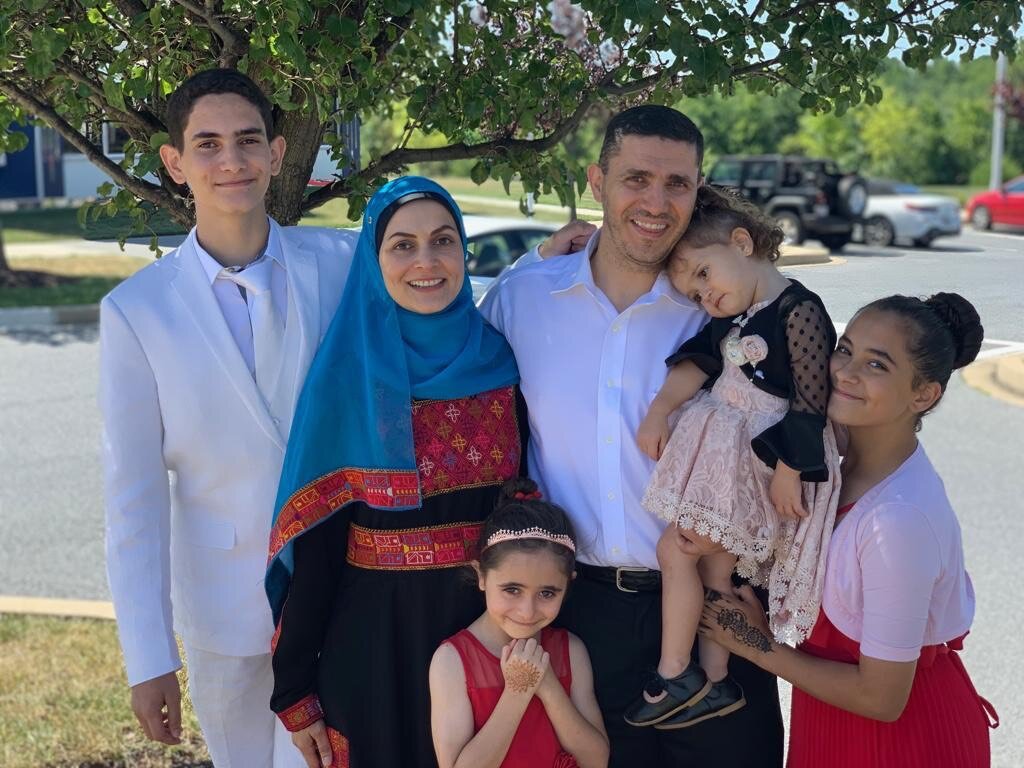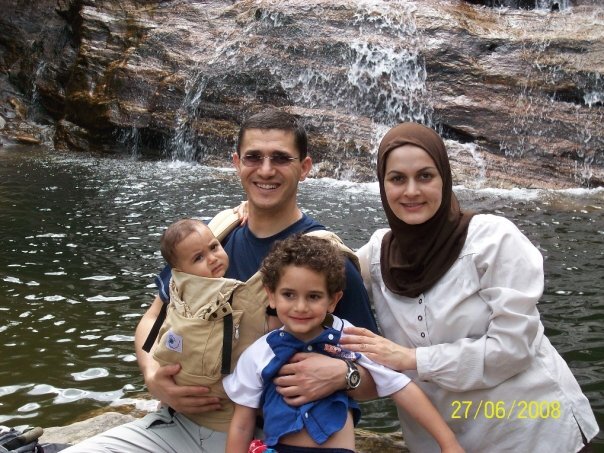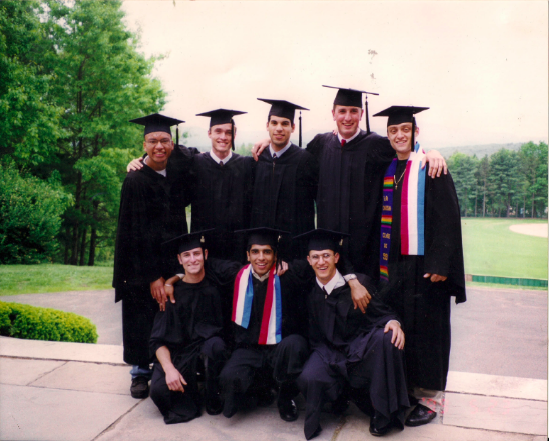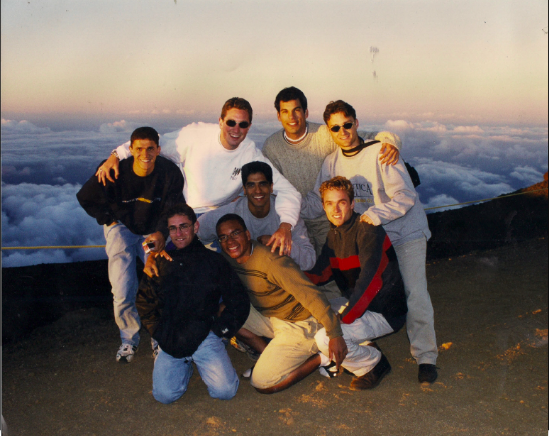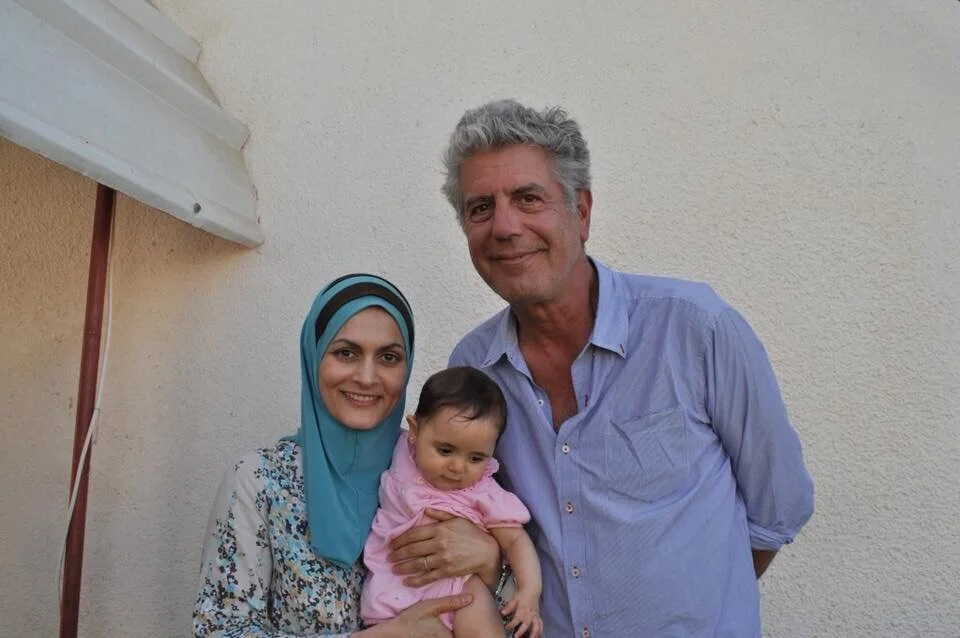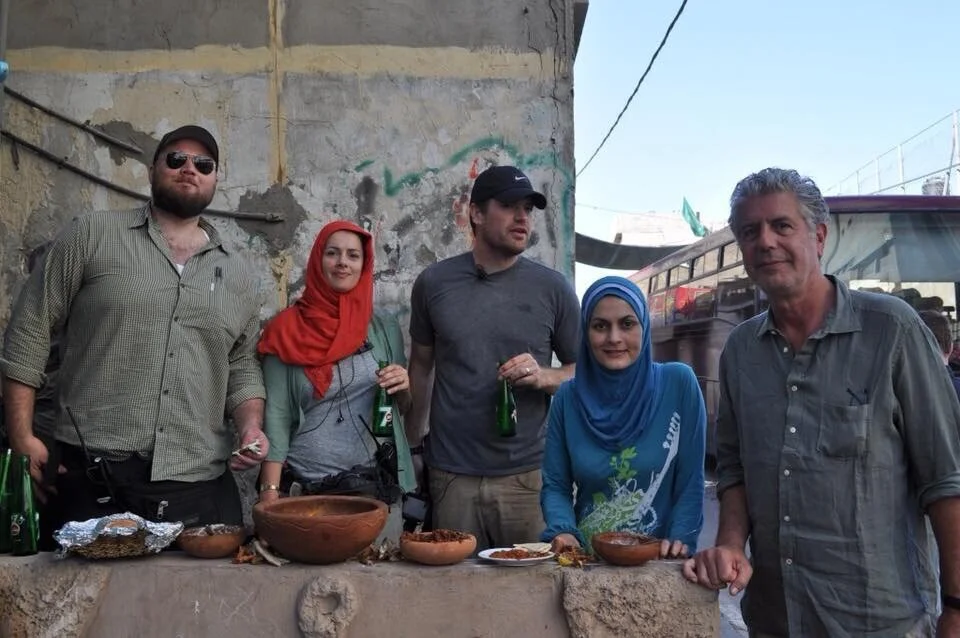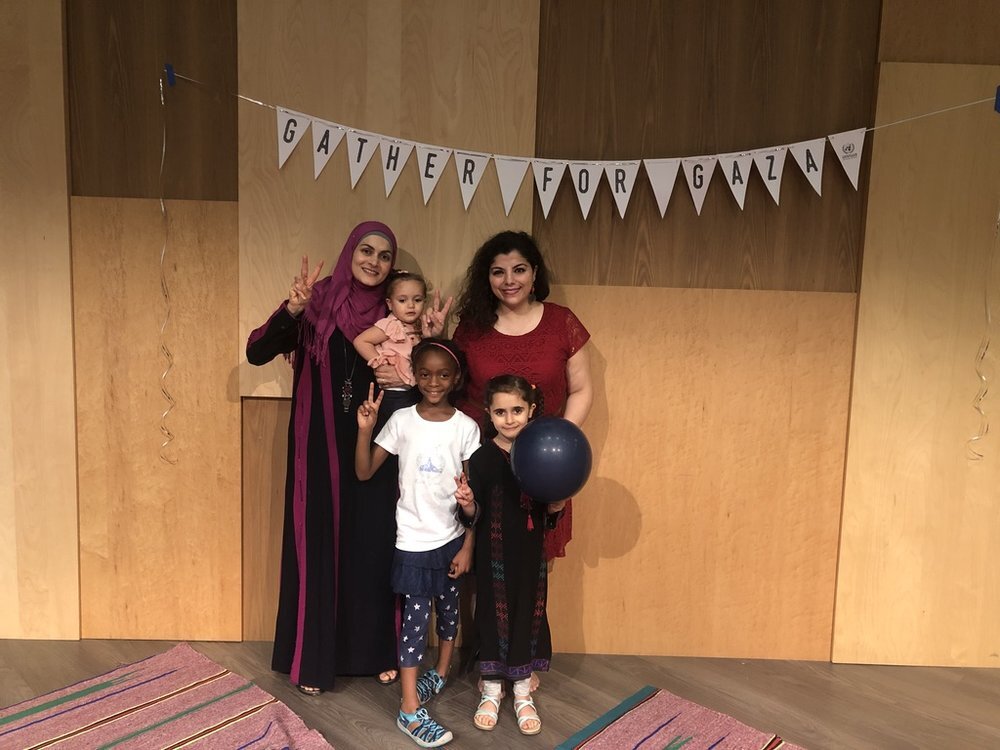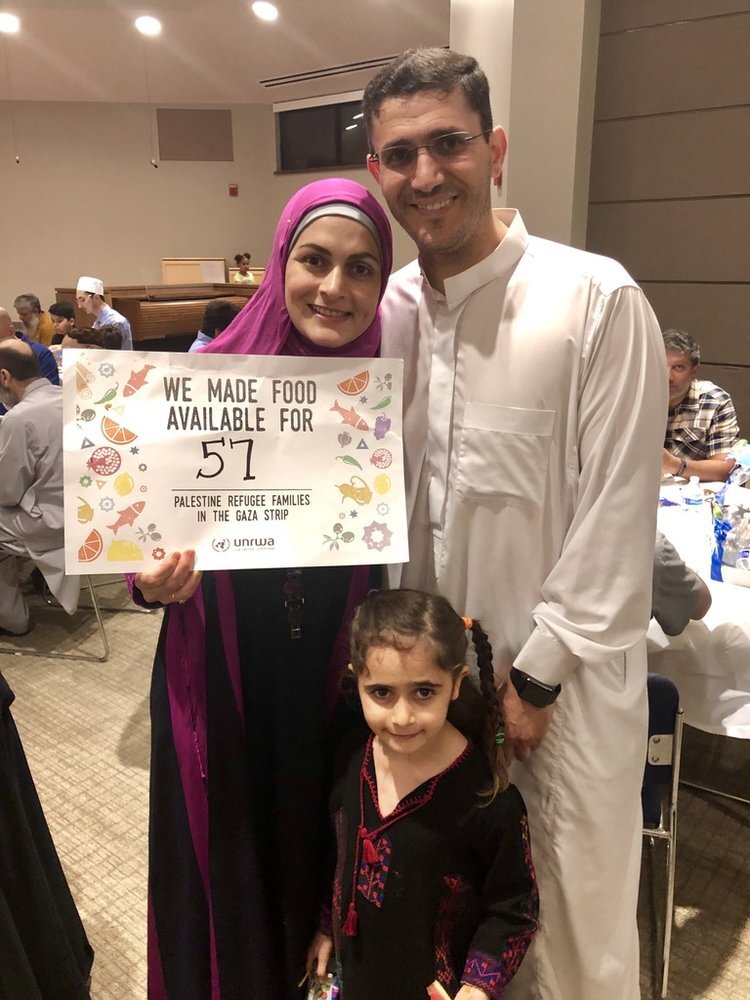Giving back to change the narrative: how the Daoud/Haddad family redefines what it means to be a refugee

A sea of Palestinian flags forms a cluster at the center of Anacostia Park. Draped on strollers, backs of runners, and even headbands, the Haddad/Daoud family’s pride is hard to miss.
A fixture at the annual Gaza 5K in Washington, DC, which is now in its eighth year, and at other UNRWA USA events, the Haddad/Daoud family has a personal connection that brings them to the walk/run year after year!
Dr. Yassine Daoud is a Palestine refugee now living in Maryland, but more than that, he is a successful medical doctor, caring father, and supportive husband to award-winning Palestinian author and public speaker Laila El-Haddad. As our country discusses who refugees are and what refugees looks like, this family has taken it upon themselves to help reshape that narrative, through participating in charitable events, giving back to their American and Palestinian communities, and sharing their own story.
Yassine’s father originally hails from a Palestinian village near Haifa called Waaret Al-Sarris, and his mother is from from Akka. During the Nakba (“catastrophe” in Arabic) in 1948, where thousands of Palestinians were forcibly made refugees, both sets of his grandparents fled north to Lebanon. They eventually found shelter in Wavel refugee camp (also known as mukheim al Jalil) in Baalbek, where UNRWA continues to provide humanitarian and development services, seven decades later.
Yassine’s family’s UNRWA registration and identification documents

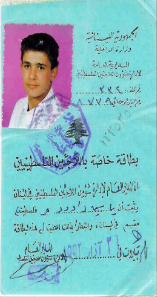
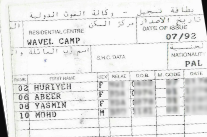
It was in this camp that Yassine grew up and spent his formative years. Raised in a 15 x 15 foot house, his family shared a cramped space, without reliable electricity, let alone the comforts of television, a refrigerator, and running water. Beyond the struggles of living in a refugee camp, he grew up during the Lebanese Civil War and his youth was shaped by violence which led to the loss of close family members.
“[One] of the beautiful things about UNRWA and its teachers [was that] they had a mission to educate the next generation. They believed in every student and wanted the best for them.”
Despite this hardship, Yassine considered his family lucky, even going so far as to say that he felt like one of the “wealthier” families in the camp because they had food on the table every day. Yassine says, “we didn’t have much, but we had a beautiful sense of community. My mom would always share whatever we had with others. It shaped my own responsibilities and sense of philanthropy. I was taught, if you’re given something, the best thing you can do is share it.”
In addition to education and healthcare services, UNRWA provides Palestine refugee families with clean, drinkable water and food assistance. Yassine’s family was one of many in Lebanon that received rations through the Agency. But among all the items they received, Yassine distinctly prized the nutritional bar which he treated as candy, so much so that he meticulously saved up his pocket money to buy bars from other students.
He recalls his time in school with fondness, smiling, admitting that he was a “bookworm and nerd.” Every time Yassine received an A on a test, his father would reward him with a book; part way through primary school he had amassed a small library, full of books that he often lent to neighboring kids. This eventually evolved into the first public library in the camp.
Yassine as a student in Montezuma, NM, surrounded by classmates from around the globe
Beyond his desire to help others and his academic success that made him an excellent doctoral candidate, one particular event altered young Yassine’s life and drove him to pursue medicine.
Amidst the height of the Lebanese Civil War, a police station next to his UNRWA school was bombed during an air raid. Yassine was in third grade at the time, and because the school was doing double shifts, he did not have class until the afternoon. Though he wasn’t impacted physically, the bomb exploded, devastating the school, killing and injuring many of his teachers, family members, and friends. He recalls going back to school, unable to see the floor due to the debris and bodies that covered it. Feeling helpless seeing so many of those near and dear to him senselessly injured, he decided that by becoming a physician, he would be able to make the greatest positive impact on others’ lives.
Given the lack of opportunities for Palestine refugees to study and access the higher education system in Lebanon, Yassine looked towards the US, Canada, and Europe for his next academic steps.
“We didn’t have much, but we had a beautiful sense of community. My mom would always share whatever we had with others. It shaped my own responsibilities and sense of philanthropy. I was taught, if you’re given something, the best thing you can do is share it.”
Meet the Daoud/Haddads
One morning, Yassine went to the UNRWA field office in the camp and saw an announcement for a scholarship to study overseas. But there was one catch: the deadline was the very next morning.
“This is one of the beautiful things about UNRWA and its teachers,” Yassine says. “They had a mission to educate the next generation. They believed in every student and wanted the best for them. So when I saw the announcement, I ran to the vice principal of the school’s home that afternoon and asked him for his help, and he was more than happy to do so.”
“One of the biggest tragedies is that we lack seeing the humanity in others. Ultimately, we are more similar than we are different. I hope that when people see me, they think to themselves that refugees have potential, and like all people, they are worthy of support and nurturing.”
They worked together from 2 in the afternoon until 10 at night to collect the necessary reports, application materials, and search for a polaroid camera (a new bit of technology in Baalbek at the time) for his photo. After quickly assembling the application, receiving sponsorship through UNRWA, and passing through the various interview rounds, he was accepted into the program offered in the US through United World College, a two year residential school in Montezuma, New Mexico with students from across the globe, hailing from over 70 countries. Feeling the mixed emotions of fear and excitement, not knowing more than a couple of sentences of English, and having never traveled to the US, Yassine left his family and Lebanon behind to pursue his academic dreams.
Yassine graduates from Amherst College alongside his friends
His high school was a melting pot, and it shaped him to see himself as part of a global community and the value inherent in all people, regardless of passport or nationality. After receiving his diploma, he received a full-ride scholarship to Amherst College and then Harvard Medical School. It was at Harvard where he met his wife, Laila El-Haddad. She is a fellow Palestinian, originally from the Gaza Strip, and uses food as a way to connect people and humanize how they see Palestinians and Palestine refugees. Her many accomplishments include giving a culinary tour of Gaza to famed chef Anthony Bourdain.
Laila shares Gaza’s culture and food with renowned chef Anthony Bourdain
After completing a residency in ophthalmology at Duke University and a medical internship at Johns Hopkins, Yassine and Laila finally settled down in Maryland, which he and his family now call home. Acknowledging their individual successes, despite the challenging paths that led them there, both Laila and Yassine feel an obligation to remain active in their communities and give back so that others can access the same opportunities they did. With food assistance and the humanitarian crisis in Gaza being an issue especially close to Laila’s heart, they’ve held multiple iftars during Ramadan to provide food assistance to Palestine refugees through UNRWA USA’s Gather for Gaza series and attended and fundraised for the DC Gaza 5K multiple years in a row.
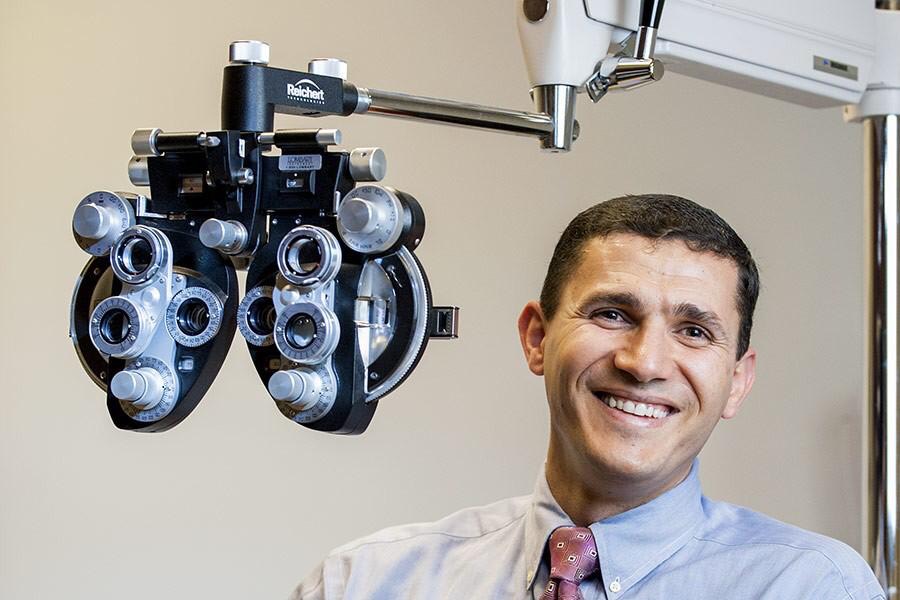
Ultimately, Yassine says he hopes through his actions he can help change the narrative around Palestine refugees. He says that “in the US we are bombarded by negative images. People found me a surprise -- that I was a successful Palestinian in the US. One of the biggest tragedies is that we lack seeing the humanity in others. Ultimately, we are more similar than we are different. I hope that when people see me, they think to themselves that refugees have potential, and like all people, they are worthy of support and nurturing.”
To that end, Yassine co-founded BRIDGE America group to help settle recent refugees in the DMV area. He also sponsors multiple Palestinian refugees in Lebanon to acquire college education.
making food available for Palestine refugees in Gaza: laila and yassine hosting their annual charitable iftar
One way that he’s putting these beliefs into practice is through his membership in the recently launched UNRWA Alumni Association (USA). It is a way for Palestine refugees in the US to connect, share their stories, and support the Agency that gave them the tools to succeed. “So many refugees I’ve met are smarter and more hard working than I am, but I was lucky with the opportunities I was given. I want to share these opportunities with others,” he explains.
Yassine’s story is just one of thousands of Palestine refugees around the world, including here at home in the United States. We invite those reading who may have benefited from UNRWA at some point in their lifetime to join him in sharing their stories as members of the UNRWA Alumni Association (USA). Learn more and apply today at: unrwausa.org/alumni.


